Semester Reflection: A Reflective Account of Learning Contents
VerifiedAdded on 2023/06/12
|9
|2470
|323
Essay
AI Summary
This essay presents a reflective account of the author's learning experiences across two academic semesters, utilizing Kolb's and Gibbs' reflective models. The reflection on Semester 1 identifies strengths in class discussions and teamwork, alongside weaknesses in time management and research skills. Abstract conceptualization leads to strategies for improvement, such as implementing time management techniques and enhancing research skills using the CRAPP tool. The reflection on Semester 2 employs Gibbs' model to analyze feelings, evaluate positive and negative aspects, and create an action plan for academic and personal development. The conclusion emphasizes the value of reflective practice in learning from past experiences and improving future performance. This document is available on Desklib, a platform offering a wide range of study tools and solved assignments for students.
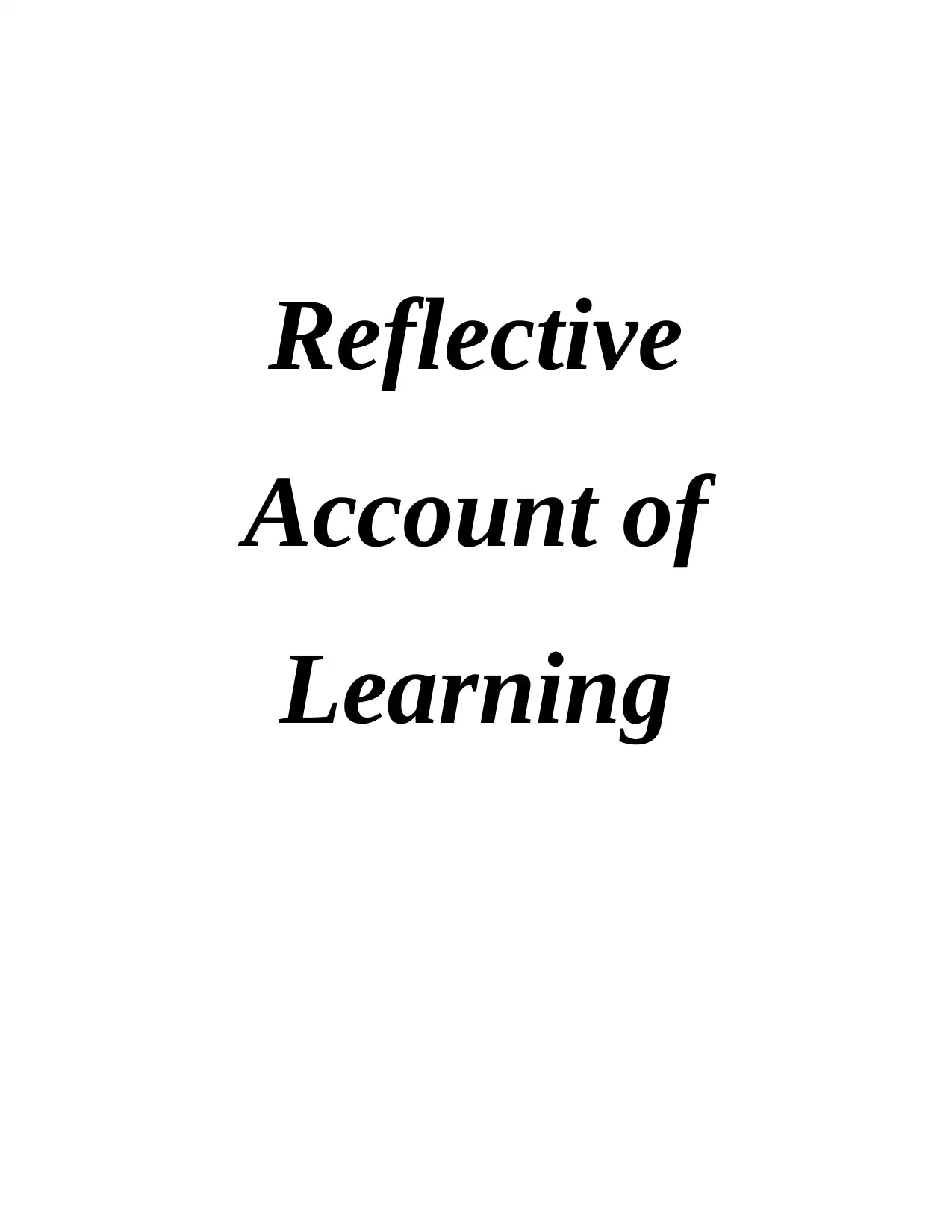
Reflective
Account of
Learning
Account of
Learning
Paraphrase This Document
Need a fresh take? Get an instant paraphrase of this document with our AI Paraphraser
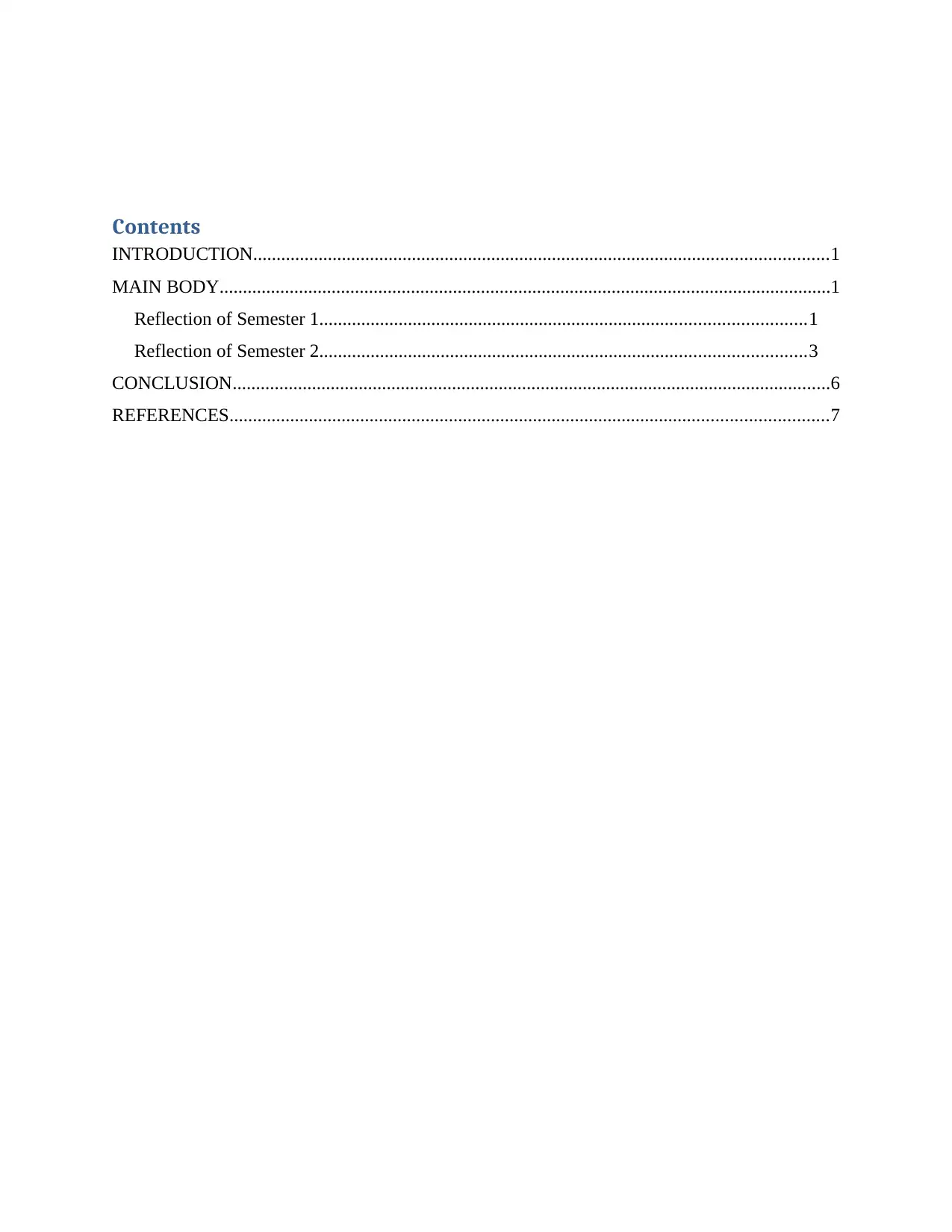
Contents
INTRODUCTION...........................................................................................................................1
MAIN BODY...................................................................................................................................1
Reflection of Semester 1........................................................................................................1
Reflection of Semester 2........................................................................................................3
CONCLUSION................................................................................................................................6
REFERENCES................................................................................................................................7
INTRODUCTION...........................................................................................................................1
MAIN BODY...................................................................................................................................1
Reflection of Semester 1........................................................................................................1
Reflection of Semester 2........................................................................................................3
CONCLUSION................................................................................................................................6
REFERENCES................................................................................................................................7
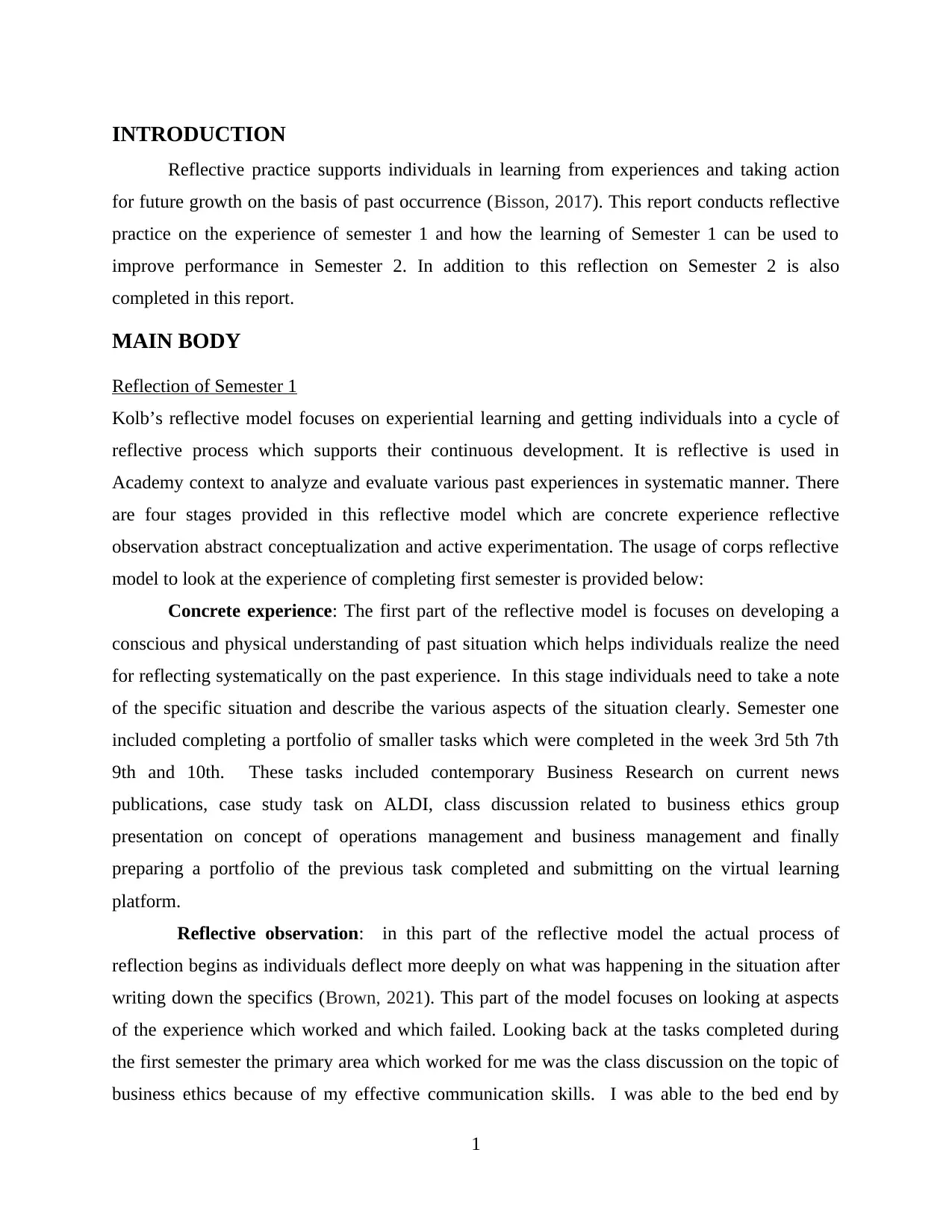
INTRODUCTION
Reflective practice supports individuals in learning from experiences and taking action
for future growth on the basis of past occurrence (Bisson, 2017). This report conducts reflective
practice on the experience of semester 1 and how the learning of Semester 1 can be used to
improve performance in Semester 2. In addition to this reflection on Semester 2 is also
completed in this report.
MAIN BODY
Reflection of Semester 1
Kolb’s reflective model focuses on experiential learning and getting individuals into a cycle of
reflective process which supports their continuous development. It is reflective is used in
Academy context to analyze and evaluate various past experiences in systematic manner. There
are four stages provided in this reflective model which are concrete experience reflective
observation abstract conceptualization and active experimentation. The usage of corps reflective
model to look at the experience of completing first semester is provided below:
Concrete experience: The first part of the reflective model is focuses on developing a
conscious and physical understanding of past situation which helps individuals realize the need
for reflecting systematically on the past experience. In this stage individuals need to take a note
of the specific situation and describe the various aspects of the situation clearly. Semester one
included completing a portfolio of smaller tasks which were completed in the week 3rd 5th 7th
9th and 10th. These tasks included contemporary Business Research on current news
publications, case study task on ALDI, class discussion related to business ethics group
presentation on concept of operations management and business management and finally
preparing a portfolio of the previous task completed and submitting on the virtual learning
platform.
Reflective observation: in this part of the reflective model the actual process of
reflection begins as individuals deflect more deeply on what was happening in the situation after
writing down the specifics (Brown, 2021). This part of the model focuses on looking at aspects
of the experience which worked and which failed. Looking back at the tasks completed during
the first semester the primary area which worked for me was the class discussion on the topic of
business ethics because of my effective communication skills. I was able to the bed end by
1
Reflective practice supports individuals in learning from experiences and taking action
for future growth on the basis of past occurrence (Bisson, 2017). This report conducts reflective
practice on the experience of semester 1 and how the learning of Semester 1 can be used to
improve performance in Semester 2. In addition to this reflection on Semester 2 is also
completed in this report.
MAIN BODY
Reflection of Semester 1
Kolb’s reflective model focuses on experiential learning and getting individuals into a cycle of
reflective process which supports their continuous development. It is reflective is used in
Academy context to analyze and evaluate various past experiences in systematic manner. There
are four stages provided in this reflective model which are concrete experience reflective
observation abstract conceptualization and active experimentation. The usage of corps reflective
model to look at the experience of completing first semester is provided below:
Concrete experience: The first part of the reflective model is focuses on developing a
conscious and physical understanding of past situation which helps individuals realize the need
for reflecting systematically on the past experience. In this stage individuals need to take a note
of the specific situation and describe the various aspects of the situation clearly. Semester one
included completing a portfolio of smaller tasks which were completed in the week 3rd 5th 7th
9th and 10th. These tasks included contemporary Business Research on current news
publications, case study task on ALDI, class discussion related to business ethics group
presentation on concept of operations management and business management and finally
preparing a portfolio of the previous task completed and submitting on the virtual learning
platform.
Reflective observation: in this part of the reflective model the actual process of
reflection begins as individuals deflect more deeply on what was happening in the situation after
writing down the specifics (Brown, 2021). This part of the model focuses on looking at aspects
of the experience which worked and which failed. Looking back at the tasks completed during
the first semester the primary area which worked for me was the class discussion on the topic of
business ethics because of my effective communication skills. I was able to the bed end by
1
⊘ This is a preview!⊘
Do you want full access?
Subscribe today to unlock all pages.

Trusted by 1+ million students worldwide
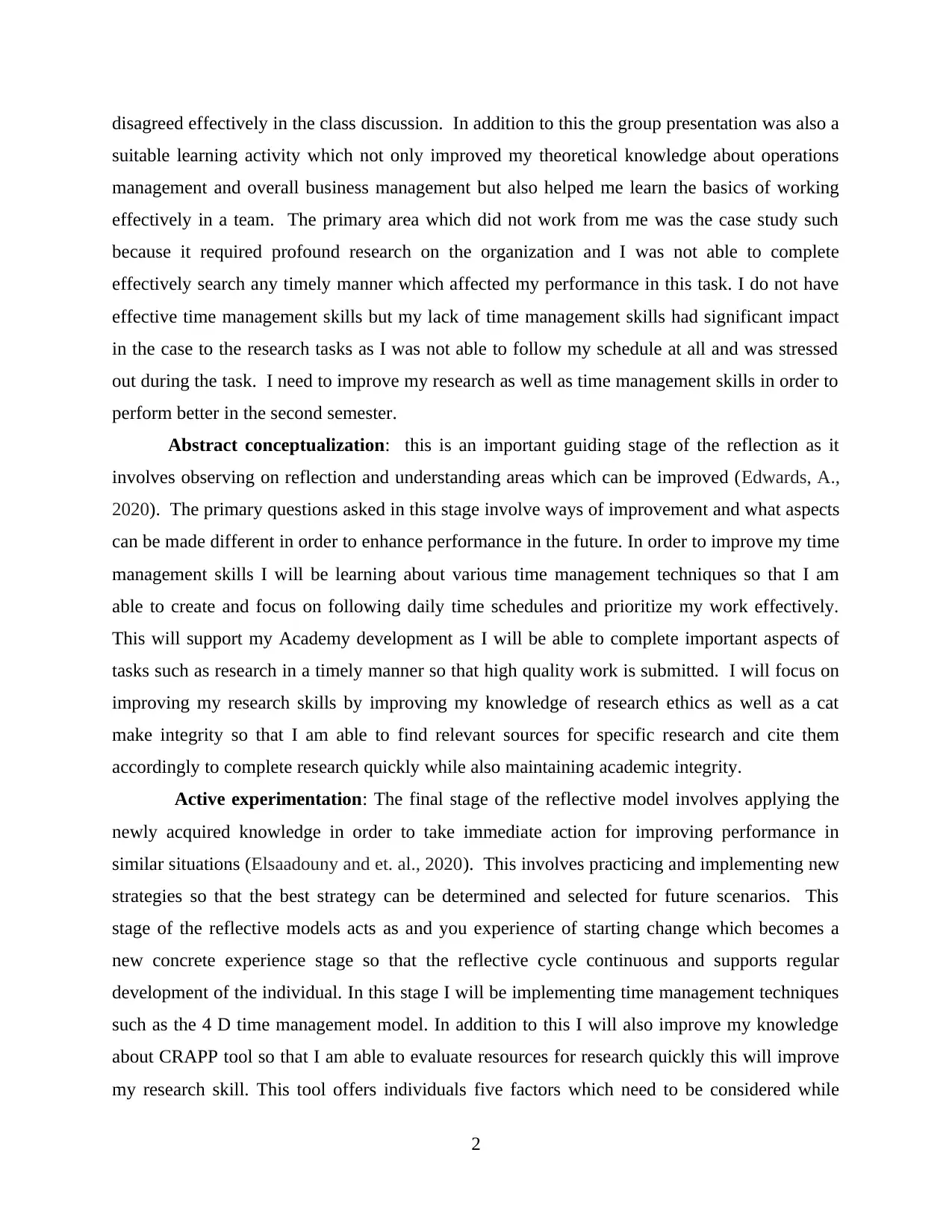
disagreed effectively in the class discussion. In addition to this the group presentation was also a
suitable learning activity which not only improved my theoretical knowledge about operations
management and overall business management but also helped me learn the basics of working
effectively in a team. The primary area which did not work from me was the case study such
because it required profound research on the organization and I was not able to complete
effectively search any timely manner which affected my performance in this task. I do not have
effective time management skills but my lack of time management skills had significant impact
in the case to the research tasks as I was not able to follow my schedule at all and was stressed
out during the task. I need to improve my research as well as time management skills in order to
perform better in the second semester.
Abstract conceptualization: this is an important guiding stage of the reflection as it
involves observing on reflection and understanding areas which can be improved (Edwards, A.,
2020). The primary questions asked in this stage involve ways of improvement and what aspects
can be made different in order to enhance performance in the future. In order to improve my time
management skills I will be learning about various time management techniques so that I am
able to create and focus on following daily time schedules and prioritize my work effectively.
This will support my Academy development as I will be able to complete important aspects of
tasks such as research in a timely manner so that high quality work is submitted. I will focus on
improving my research skills by improving my knowledge of research ethics as well as a cat
make integrity so that I am able to find relevant sources for specific research and cite them
accordingly to complete research quickly while also maintaining academic integrity.
Active experimentation: The final stage of the reflective model involves applying the
newly acquired knowledge in order to take immediate action for improving performance in
similar situations (Elsaadouny and et. al., 2020). This involves practicing and implementing new
strategies so that the best strategy can be determined and selected for future scenarios. This
stage of the reflective models acts as and you experience of starting change which becomes a
new concrete experience stage so that the reflective cycle continuous and supports regular
development of the individual. In this stage I will be implementing time management techniques
such as the 4 D time management model. In addition to this I will also improve my knowledge
about CRAPP tool so that I am able to evaluate resources for research quickly this will improve
my research skill. This tool offers individuals five factors which need to be considered while
2
suitable learning activity which not only improved my theoretical knowledge about operations
management and overall business management but also helped me learn the basics of working
effectively in a team. The primary area which did not work from me was the case study such
because it required profound research on the organization and I was not able to complete
effectively search any timely manner which affected my performance in this task. I do not have
effective time management skills but my lack of time management skills had significant impact
in the case to the research tasks as I was not able to follow my schedule at all and was stressed
out during the task. I need to improve my research as well as time management skills in order to
perform better in the second semester.
Abstract conceptualization: this is an important guiding stage of the reflection as it
involves observing on reflection and understanding areas which can be improved (Edwards, A.,
2020). The primary questions asked in this stage involve ways of improvement and what aspects
can be made different in order to enhance performance in the future. In order to improve my time
management skills I will be learning about various time management techniques so that I am
able to create and focus on following daily time schedules and prioritize my work effectively.
This will support my Academy development as I will be able to complete important aspects of
tasks such as research in a timely manner so that high quality work is submitted. I will focus on
improving my research skills by improving my knowledge of research ethics as well as a cat
make integrity so that I am able to find relevant sources for specific research and cite them
accordingly to complete research quickly while also maintaining academic integrity.
Active experimentation: The final stage of the reflective model involves applying the
newly acquired knowledge in order to take immediate action for improving performance in
similar situations (Elsaadouny and et. al., 2020). This involves practicing and implementing new
strategies so that the best strategy can be determined and selected for future scenarios. This
stage of the reflective models acts as and you experience of starting change which becomes a
new concrete experience stage so that the reflective cycle continuous and supports regular
development of the individual. In this stage I will be implementing time management techniques
such as the 4 D time management model. In addition to this I will also improve my knowledge
about CRAPP tool so that I am able to evaluate resources for research quickly this will improve
my research skill. This tool offers individuals five factors which need to be considered while
2
Paraphrase This Document
Need a fresh take? Get an instant paraphrase of this document with our AI Paraphraser
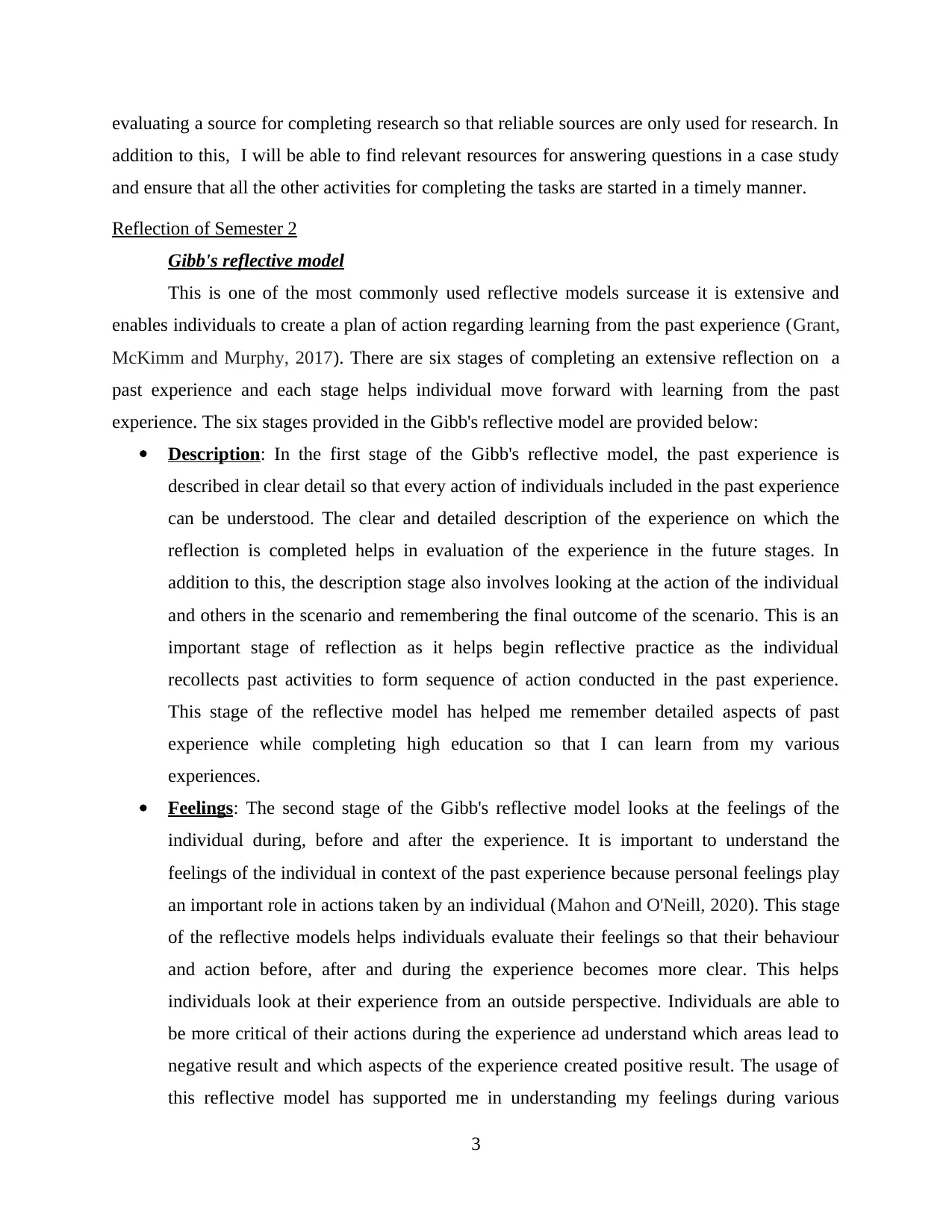
evaluating a source for completing research so that reliable sources are only used for research. In
addition to this, I will be able to find relevant resources for answering questions in a case study
and ensure that all the other activities for completing the tasks are started in a timely manner.
Reflection of Semester 2
Gibb's reflective model
This is one of the most commonly used reflective models surcease it is extensive and
enables individuals to create a plan of action regarding learning from the past experience (Grant,
McKimm and Murphy, 2017). There are six stages of completing an extensive reflection on a
past experience and each stage helps individual move forward with learning from the past
experience. The six stages provided in the Gibb's reflective model are provided below:
Description: In the first stage of the Gibb's reflective model, the past experience is
described in clear detail so that every action of individuals included in the past experience
can be understood. The clear and detailed description of the experience on which the
reflection is completed helps in evaluation of the experience in the future stages. In
addition to this, the description stage also involves looking at the action of the individual
and others in the scenario and remembering the final outcome of the scenario. This is an
important stage of reflection as it helps begin reflective practice as the individual
recollects past activities to form sequence of action conducted in the past experience.
This stage of the reflective model has helped me remember detailed aspects of past
experience while completing high education so that I can learn from my various
experiences.
Feelings: The second stage of the Gibb's reflective model looks at the feelings of the
individual during, before and after the experience. It is important to understand the
feelings of the individual in context of the past experience because personal feelings play
an important role in actions taken by an individual (Mahon and O'Neill, 2020). This stage
of the reflective models helps individuals evaluate their feelings so that their behaviour
and action before, after and during the experience becomes more clear. This helps
individuals look at their experience from an outside perspective. Individuals are able to
be more critical of their actions during the experience ad understand which areas lead to
negative result and which aspects of the experience created positive result. The usage of
this reflective model has supported me in understanding my feelings during various
3
addition to this, I will be able to find relevant resources for answering questions in a case study
and ensure that all the other activities for completing the tasks are started in a timely manner.
Reflection of Semester 2
Gibb's reflective model
This is one of the most commonly used reflective models surcease it is extensive and
enables individuals to create a plan of action regarding learning from the past experience (Grant,
McKimm and Murphy, 2017). There are six stages of completing an extensive reflection on a
past experience and each stage helps individual move forward with learning from the past
experience. The six stages provided in the Gibb's reflective model are provided below:
Description: In the first stage of the Gibb's reflective model, the past experience is
described in clear detail so that every action of individuals included in the past experience
can be understood. The clear and detailed description of the experience on which the
reflection is completed helps in evaluation of the experience in the future stages. In
addition to this, the description stage also involves looking at the action of the individual
and others in the scenario and remembering the final outcome of the scenario. This is an
important stage of reflection as it helps begin reflective practice as the individual
recollects past activities to form sequence of action conducted in the past experience.
This stage of the reflective model has helped me remember detailed aspects of past
experience while completing high education so that I can learn from my various
experiences.
Feelings: The second stage of the Gibb's reflective model looks at the feelings of the
individual during, before and after the experience. It is important to understand the
feelings of the individual in context of the past experience because personal feelings play
an important role in actions taken by an individual (Mahon and O'Neill, 2020). This stage
of the reflective models helps individuals evaluate their feelings so that their behaviour
and action before, after and during the experience becomes more clear. This helps
individuals look at their experience from an outside perspective. Individuals are able to
be more critical of their actions during the experience ad understand which areas lead to
negative result and which aspects of the experience created positive result. The usage of
this reflective model has supported me in understanding my feelings during various
3
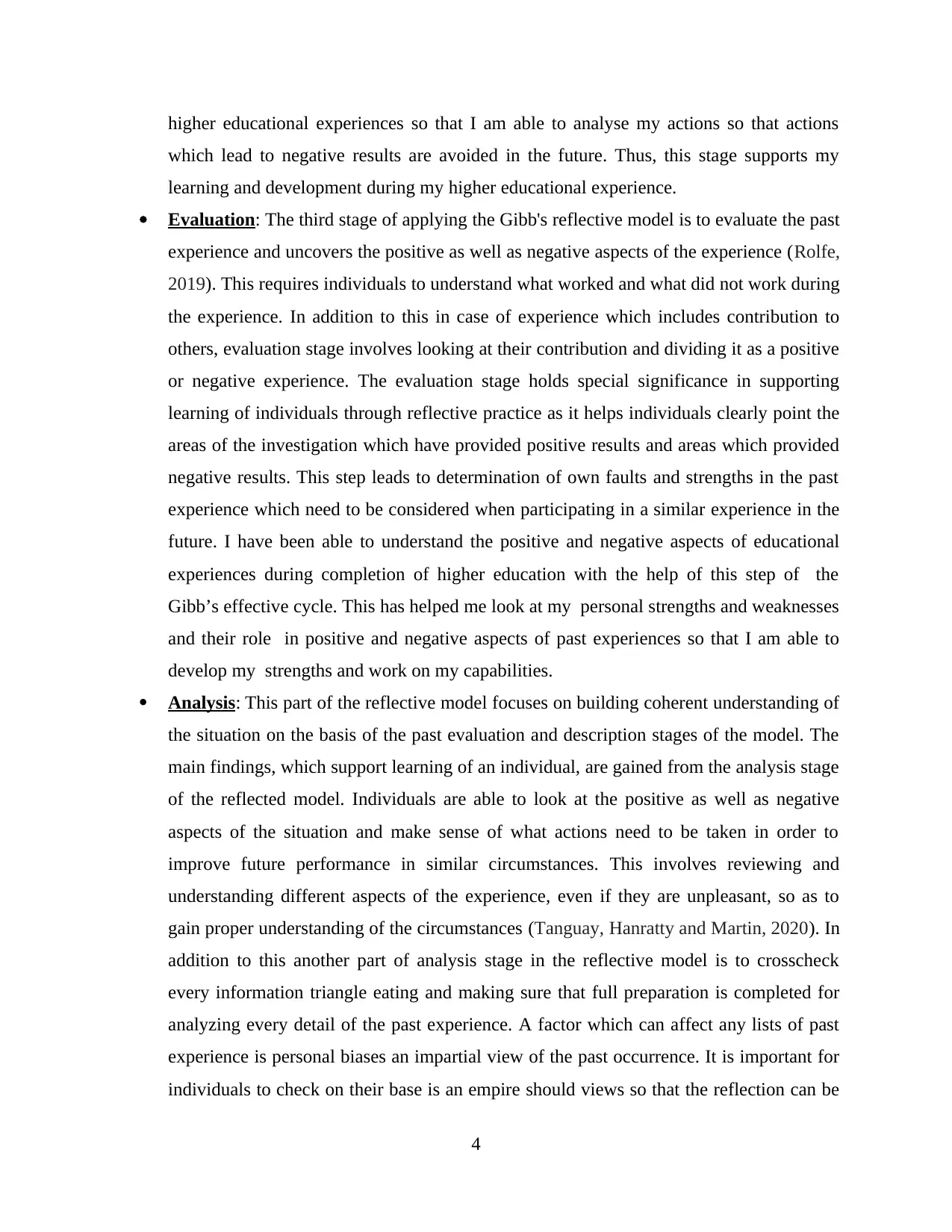
higher educational experiences so that I am able to analyse my actions so that actions
which lead to negative results are avoided in the future. Thus, this stage supports my
learning and development during my higher educational experience.
Evaluation: The third stage of applying the Gibb's reflective model is to evaluate the past
experience and uncovers the positive as well as negative aspects of the experience (Rolfe,
2019). This requires individuals to understand what worked and what did not work during
the experience. In addition to this in case of experience which includes contribution to
others, evaluation stage involves looking at their contribution and dividing it as a positive
or negative experience. The evaluation stage holds special significance in supporting
learning of individuals through reflective practice as it helps individuals clearly point the
areas of the investigation which have provided positive results and areas which provided
negative results. This step leads to determination of own faults and strengths in the past
experience which need to be considered when participating in a similar experience in the
future. I have been able to understand the positive and negative aspects of educational
experiences during completion of higher education with the help of this step of the
Gibb’s effective cycle. This has helped me look at my personal strengths and weaknesses
and their role in positive and negative aspects of past experiences so that I am able to
develop my strengths and work on my capabilities.
Analysis: This part of the reflective model focuses on building coherent understanding of
the situation on the basis of the past evaluation and description stages of the model. The
main findings, which support learning of an individual, are gained from the analysis stage
of the reflected model. Individuals are able to look at the positive as well as negative
aspects of the situation and make sense of what actions need to be taken in order to
improve future performance in similar circumstances. This involves reviewing and
understanding different aspects of the experience, even if they are unpleasant, so as to
gain proper understanding of the circumstances (Tanguay, Hanratty and Martin, 2020). In
addition to this another part of analysis stage in the reflective model is to crosscheck
every information triangle eating and making sure that full preparation is completed for
analyzing every detail of the past experience. A factor which can affect any lists of past
experience is personal biases an impartial view of the past occurrence. It is important for
individuals to check on their base is an empire should views so that the reflection can be
4
which lead to negative results are avoided in the future. Thus, this stage supports my
learning and development during my higher educational experience.
Evaluation: The third stage of applying the Gibb's reflective model is to evaluate the past
experience and uncovers the positive as well as negative aspects of the experience (Rolfe,
2019). This requires individuals to understand what worked and what did not work during
the experience. In addition to this in case of experience which includes contribution to
others, evaluation stage involves looking at their contribution and dividing it as a positive
or negative experience. The evaluation stage holds special significance in supporting
learning of individuals through reflective practice as it helps individuals clearly point the
areas of the investigation which have provided positive results and areas which provided
negative results. This step leads to determination of own faults and strengths in the past
experience which need to be considered when participating in a similar experience in the
future. I have been able to understand the positive and negative aspects of educational
experiences during completion of higher education with the help of this step of the
Gibb’s effective cycle. This has helped me look at my personal strengths and weaknesses
and their role in positive and negative aspects of past experiences so that I am able to
develop my strengths and work on my capabilities.
Analysis: This part of the reflective model focuses on building coherent understanding of
the situation on the basis of the past evaluation and description stages of the model. The
main findings, which support learning of an individual, are gained from the analysis stage
of the reflected model. Individuals are able to look at the positive as well as negative
aspects of the situation and make sense of what actions need to be taken in order to
improve future performance in similar circumstances. This involves reviewing and
understanding different aspects of the experience, even if they are unpleasant, so as to
gain proper understanding of the circumstances (Tanguay, Hanratty and Martin, 2020). In
addition to this another part of analysis stage in the reflective model is to crosscheck
every information triangle eating and making sure that full preparation is completed for
analyzing every detail of the past experience. A factor which can affect any lists of past
experience is personal biases an impartial view of the past occurrence. It is important for
individuals to check on their base is an empire should views so that the reflection can be
4
⊘ This is a preview!⊘
Do you want full access?
Subscribe today to unlock all pages.

Trusted by 1+ million students worldwide
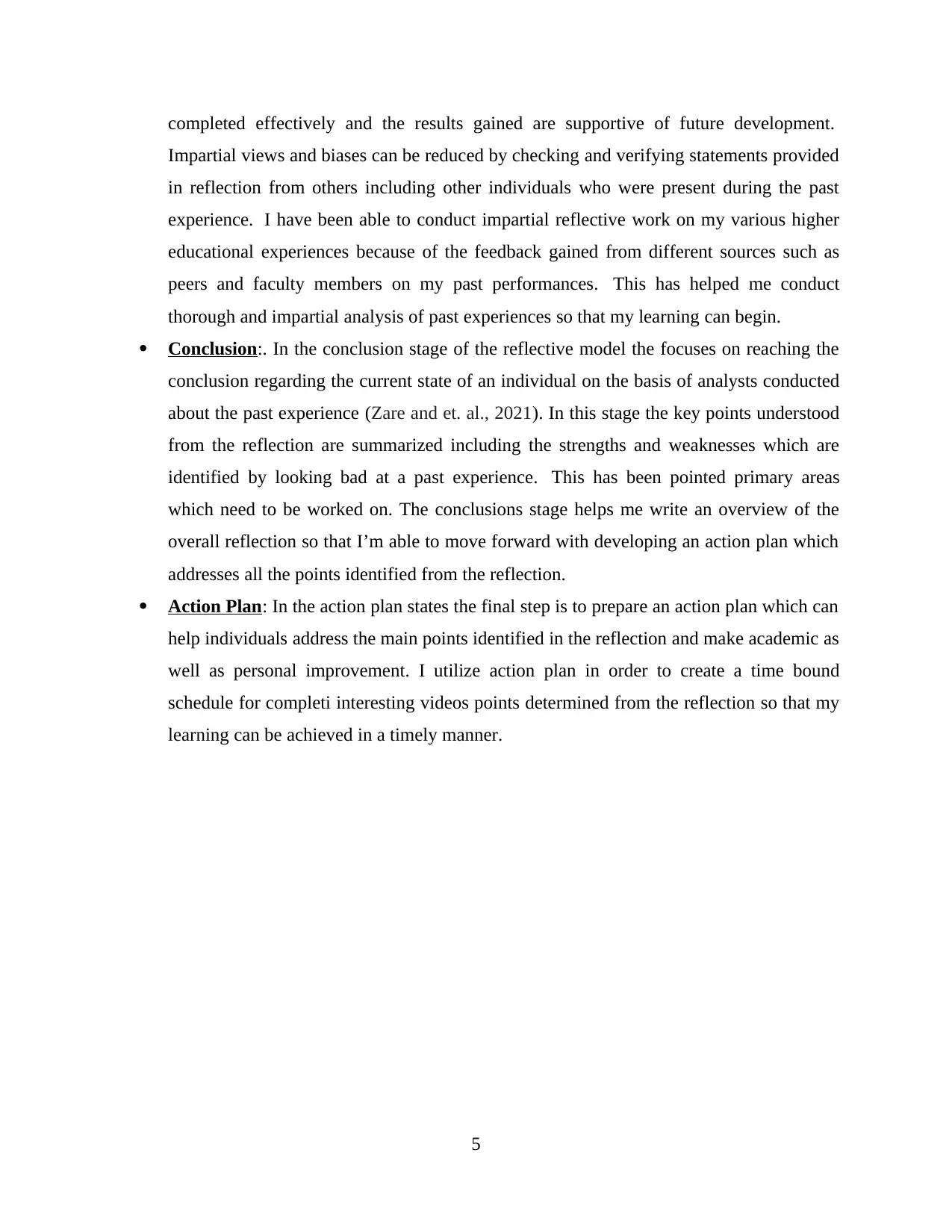
completed effectively and the results gained are supportive of future development.
Impartial views and biases can be reduced by checking and verifying statements provided
in reflection from others including other individuals who were present during the past
experience. I have been able to conduct impartial reflective work on my various higher
educational experiences because of the feedback gained from different sources such as
peers and faculty members on my past performances. This has helped me conduct
thorough and impartial analysis of past experiences so that my learning can begin.
Conclusion:. In the conclusion stage of the reflective model the focuses on reaching the
conclusion regarding the current state of an individual on the basis of analysts conducted
about the past experience (Zare and et. al., 2021). In this stage the key points understood
from the reflection are summarized including the strengths and weaknesses which are
identified by looking bad at a past experience. This has been pointed primary areas
which need to be worked on. The conclusions stage helps me write an overview of the
overall reflection so that I’m able to move forward with developing an action plan which
addresses all the points identified from the reflection.
Action Plan: In the action plan states the final step is to prepare an action plan which can
help individuals address the main points identified in the reflection and make academic as
well as personal improvement. I utilize action plan in order to create a time bound
schedule for completi interesting videos points determined from the reflection so that my
learning can be achieved in a timely manner.
5
Impartial views and biases can be reduced by checking and verifying statements provided
in reflection from others including other individuals who were present during the past
experience. I have been able to conduct impartial reflective work on my various higher
educational experiences because of the feedback gained from different sources such as
peers and faculty members on my past performances. This has helped me conduct
thorough and impartial analysis of past experiences so that my learning can begin.
Conclusion:. In the conclusion stage of the reflective model the focuses on reaching the
conclusion regarding the current state of an individual on the basis of analysts conducted
about the past experience (Zare and et. al., 2021). In this stage the key points understood
from the reflection are summarized including the strengths and weaknesses which are
identified by looking bad at a past experience. This has been pointed primary areas
which need to be worked on. The conclusions stage helps me write an overview of the
overall reflection so that I’m able to move forward with developing an action plan which
addresses all the points identified from the reflection.
Action Plan: In the action plan states the final step is to prepare an action plan which can
help individuals address the main points identified in the reflection and make academic as
well as personal improvement. I utilize action plan in order to create a time bound
schedule for completi interesting videos points determined from the reflection so that my
learning can be achieved in a timely manner.
5
Paraphrase This Document
Need a fresh take? Get an instant paraphrase of this document with our AI Paraphraser
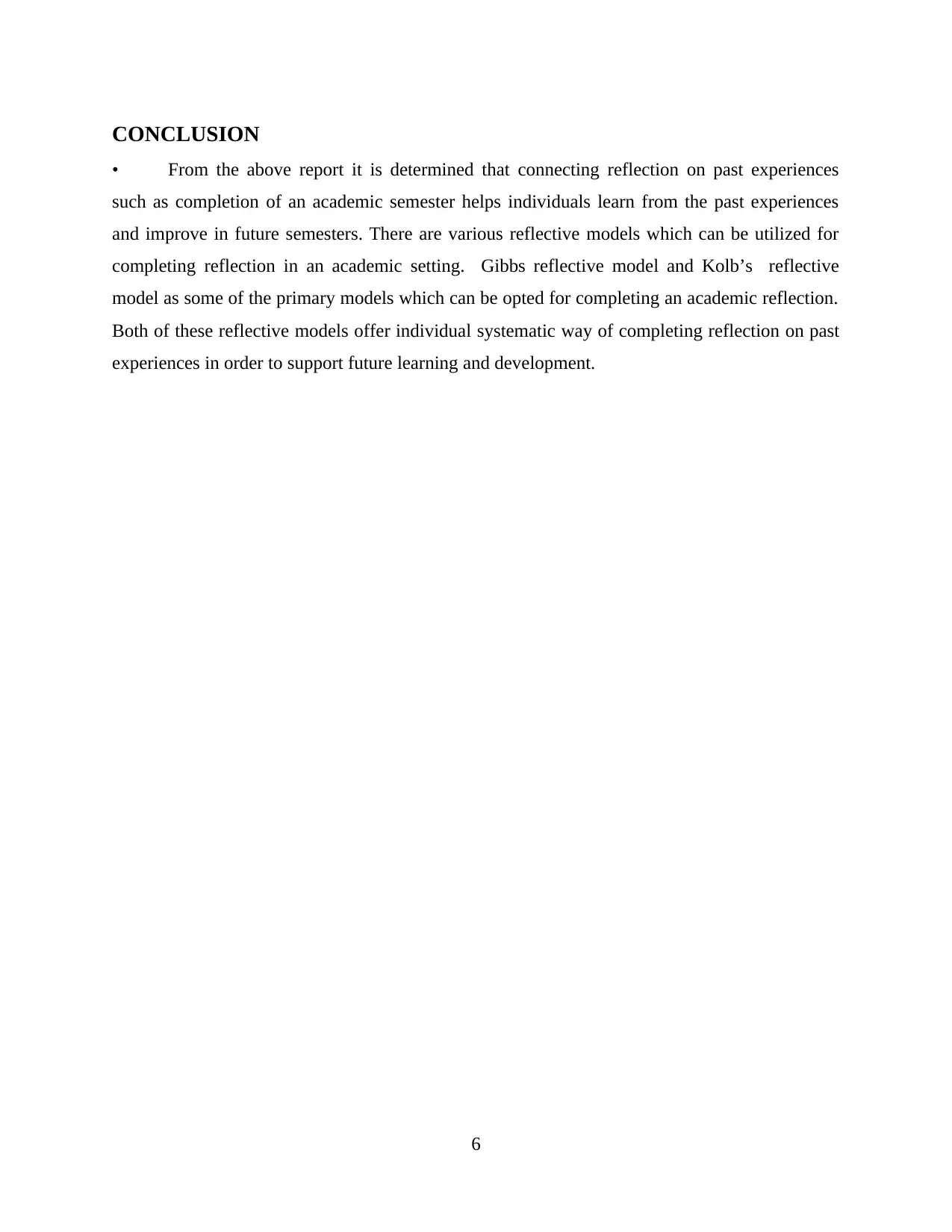
CONCLUSION
• From the above report it is determined that connecting reflection on past experiences
such as completion of an academic semester helps individuals learn from the past experiences
and improve in future semesters. There are various reflective models which can be utilized for
completing reflection in an academic setting. Gibbs reflective model and Kolb’s reflective
model as some of the primary models which can be opted for completing an academic reflection.
Both of these reflective models offer individual systematic way of completing reflection on past
experiences in order to support future learning and development.
6
• From the above report it is determined that connecting reflection on past experiences
such as completion of an academic semester helps individuals learn from the past experiences
and improve in future semesters. There are various reflective models which can be utilized for
completing reflection in an academic setting. Gibbs reflective model and Kolb’s reflective
model as some of the primary models which can be opted for completing an academic reflection.
Both of these reflective models offer individual systematic way of completing reflection on past
experiences in order to support future learning and development.
6
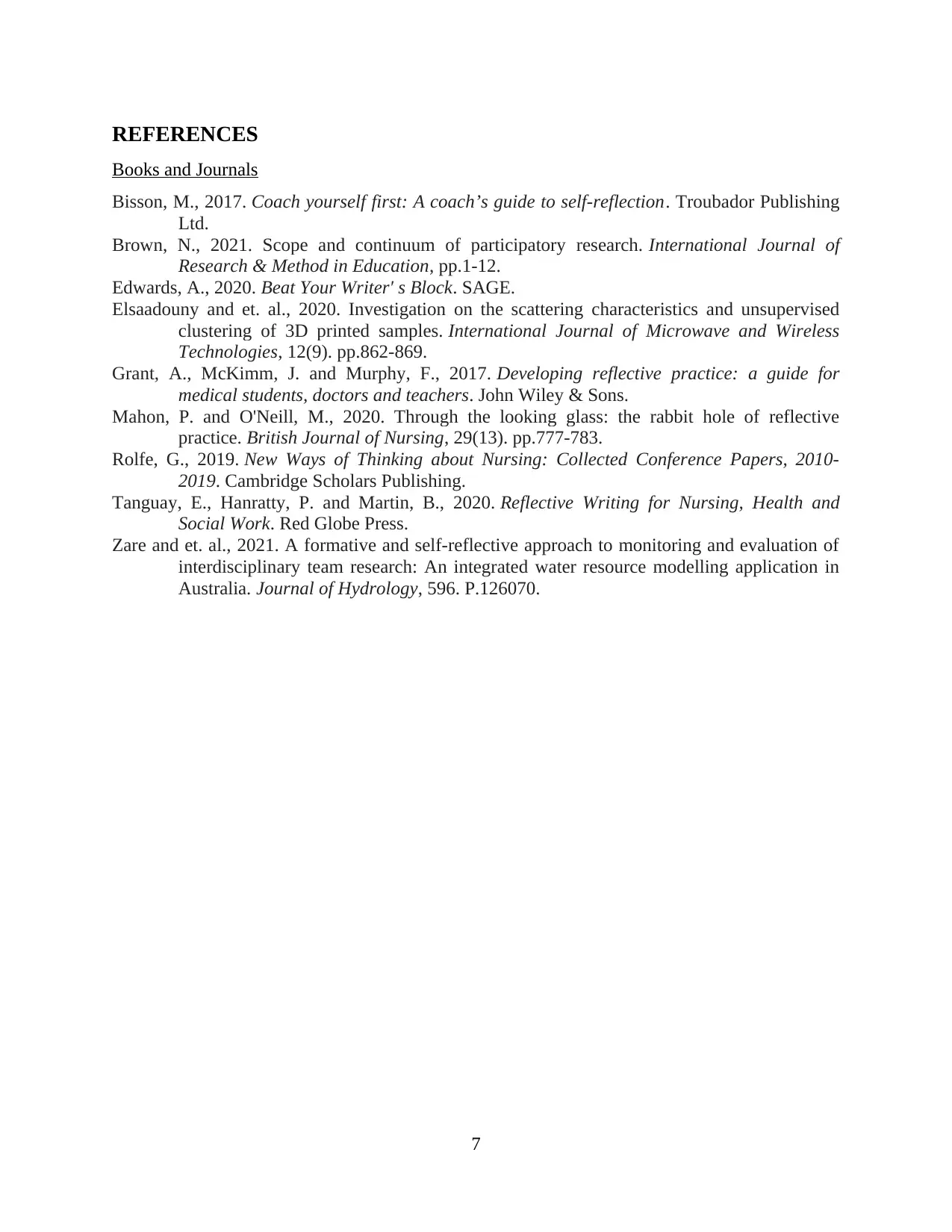
REFERENCES
Books and Journals
Bisson, M., 2017. Coach yourself first: A coach’s guide to self-reflection. Troubador Publishing
Ltd.
Brown, N., 2021. Scope and continuum of participatory research. International Journal of
Research & Method in Education, pp.1-12.
Edwards, A., 2020. Beat Your Writer′ s Block. SAGE.
Elsaadouny and et. al., 2020. Investigation on the scattering characteristics and unsupervised
clustering of 3D printed samples. International Journal of Microwave and Wireless
Technologies, 12(9). pp.862-869.
Grant, A., McKimm, J. and Murphy, F., 2017. Developing reflective practice: a guide for
medical students, doctors and teachers. John Wiley & Sons.
Mahon, P. and O'Neill, M., 2020. Through the looking glass: the rabbit hole of reflective
practice. British Journal of Nursing, 29(13). pp.777-783.
Rolfe, G., 2019. New Ways of Thinking about Nursing: Collected Conference Papers, 2010-
2019. Cambridge Scholars Publishing.
Tanguay, E., Hanratty, P. and Martin, B., 2020. Reflective Writing for Nursing, Health and
Social Work. Red Globe Press.
Zare and et. al., 2021. A formative and self-reflective approach to monitoring and evaluation of
interdisciplinary team research: An integrated water resource modelling application in
Australia. Journal of Hydrology, 596. P.126070.
7
Books and Journals
Bisson, M., 2017. Coach yourself first: A coach’s guide to self-reflection. Troubador Publishing
Ltd.
Brown, N., 2021. Scope and continuum of participatory research. International Journal of
Research & Method in Education, pp.1-12.
Edwards, A., 2020. Beat Your Writer′ s Block. SAGE.
Elsaadouny and et. al., 2020. Investigation on the scattering characteristics and unsupervised
clustering of 3D printed samples. International Journal of Microwave and Wireless
Technologies, 12(9). pp.862-869.
Grant, A., McKimm, J. and Murphy, F., 2017. Developing reflective practice: a guide for
medical students, doctors and teachers. John Wiley & Sons.
Mahon, P. and O'Neill, M., 2020. Through the looking glass: the rabbit hole of reflective
practice. British Journal of Nursing, 29(13). pp.777-783.
Rolfe, G., 2019. New Ways of Thinking about Nursing: Collected Conference Papers, 2010-
2019. Cambridge Scholars Publishing.
Tanguay, E., Hanratty, P. and Martin, B., 2020. Reflective Writing for Nursing, Health and
Social Work. Red Globe Press.
Zare and et. al., 2021. A formative and self-reflective approach to monitoring and evaluation of
interdisciplinary team research: An integrated water resource modelling application in
Australia. Journal of Hydrology, 596. P.126070.
7
⊘ This is a preview!⊘
Do you want full access?
Subscribe today to unlock all pages.

Trusted by 1+ million students worldwide
1 out of 9
Related Documents
Your All-in-One AI-Powered Toolkit for Academic Success.
+13062052269
info@desklib.com
Available 24*7 on WhatsApp / Email
![[object Object]](/_next/static/media/star-bottom.7253800d.svg)
Unlock your academic potential
Copyright © 2020–2026 A2Z Services. All Rights Reserved. Developed and managed by ZUCOL.




